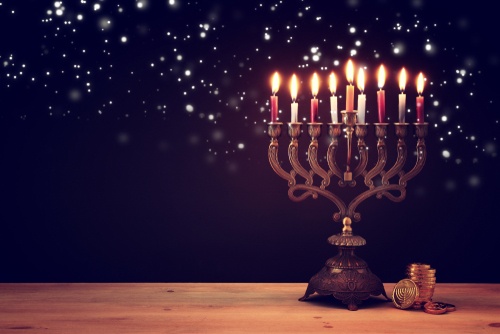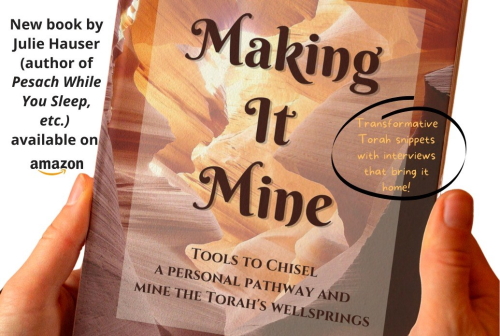By Miriam Julie Hauser
I am not a rebbetzin nor a meditation guide. After I agreed to write on the topic, “What can bring on miracles,” I wondered, how am I qualified? I am just a regular lady who spends a lot of time dropping off online returns. I gave it some time, knowing this article would take longer to percolate in my head before I would compose it.
I started by just thinking, what is the word “miracle?” The Hebrew word “nes,” which we translate as miracle, means “banner.” It’s like a flag saying, “Something happened here; X marks the spot; We notice Hashem here; Something changed,” etc. I pondered that for a while. How do we “bring it on,” though, other than by yearning?
And then, one day, I was early. No, I’m not saying that’s a miracle, but it is unusual. Finally, early for something! I got to the UPS store before it opened!
What does a Jewish mama do while waiting in a parking lot (with no waving carpool traffic officers)? She says a few chapters of Tehillim. I looked up once in a while, blandly gazing at the near-bare bush between my parking space and the empty UPS store. A few reddish-brown crusted leaves held on tenaciously on this windy, early December morning. Just a few leaves remained, but I could momentarily appreciate their pretty red tinge.
Then I looked again, and there, interspersed within the bush, perched on tiny bare branches, chirped six sweet, plump, grey and red-chested birds. Were they there just a second ago? (Was my nine-year-old hiding in the back seat performing another magic trick? With birds!?) I had not detected their arrival, yet they appeared like they paid rent for that bush! The beak of the bird closest to my windshield rapidly opened and shut, speaking right toward me with my Chanukah message: “Look again.”

What is a nes but a new way of looking at things? Look twice. Look deeper, look again. A second look! Just like a flame is not the same flame second by second – it is consumed and is renewed – our children, our souls, our relationships are not the same moment to moment – or don’t have to be. Each moment we can look at them again, in a new light, with fresh eyes.
And we can look for the good, trying to bring in the gratitude. Our nation is called Yehudim, the root of which translates as ‘admit,’ because one has to admit in order to thank.
I am still learning a lot from the teachings of Rabbi Wallerstein, zt”l, as well as his example. He constantly spoke about giving every moment, and every person, a second look. Don’t judge the surface…and, maybe, don’t even judge.
He held up a full Poland Springs bottle (in front of a huge listening audience) and announced he couldn’t make a shehakol blessing on the drink because… the bottle was filled with vinegar! He wanted to teach the lesson: look twice, look within, look for more, don’t judge so quickly. Can we do this with ourselves, with each other, just a little bit more? What might we see flickering? What darkness will we be able to illuminate?
I love what I heard Rav Shimshon Dovid Pincus, zt”l, suggest in a shiur on tefillah (prayer) regarding how to behave in times of darkness. He said, “Generate an appreciation, a happiness, a shira (praiseful song) to Hashem! It should be PERSONAL. Shira is a deep personal expression. Every one of us should compose in our hearts a poem to Hashem, an appreciation to Hashem. Think of all the beautiful things that Hashem gave to you, and say to Hashem, ‘Hashem, you gave me my family, you gave me life, you gave me Torah, thank you Hashem.’ SING to Hashem.”
Rav Pincus said that the end of the galut (exile) will be an advertisement of Hashem’s kingship and Hashem’s closeness, and Hashem will take us out of this galut by personal connection. He emphasized that while living in a world full of materialism and impurity, when and if we find a way to make a personal shira (“In such a world, full of media, technology, and amidst a world in the ten millionth gate of impurity [said in the ’90s], I can be a yid (a Jew), I can raise Jewish children, I can teach Jewish children, I can daven from Your siddur, and sing to You, Hashem a personal shira”), then that shira is one which even the greatest of Jews and rabbanim of the past could never say, and it will bring on geula (redemption). “Let us say that shir. Sing to Hashem, and ask for more. And on that shir, sign your name.”
So, as we look at the Chanukah neiros (candles), let’s try it: give a second look, write that poem to Hashem, sign our names, and ask for more – and even better than we can imagine!
A freilichen Chanukah!
Bio:
Julie is an occupational therapist, photographer, and author of several books including her newest, titled Making It Mine. You may recognize her as the author of Pesach While You Sleep, or one of her other titles available here. Julie lives with her husband and children (who wonder which occupation is her ‘real job’) in Detroit, Michigan.






